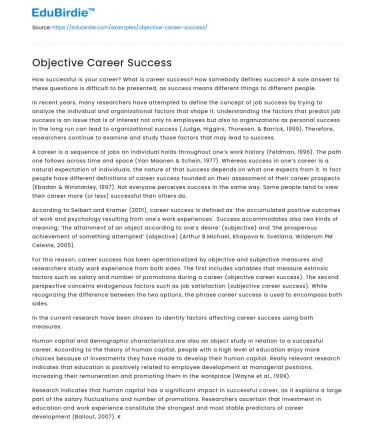How successful is your career? What is career success? How somebody defines success? A sole answer to these questions is difficult to be presented, as success means different things to different people.
In recent years, many researchers have attempted to define the concept of job success by trying to analyze the individual and organizational factors that shape it. Understanding the factors that predict job success is an issue that is of interest not only to employees but also to organizations as personal success in the long run can lead to organizational success (Judge, Higgins, Thoresen, & Barrick, 1999). Therefore, researchers continue to examine and study those factors that may lead to success.
Save your time!
We can take care of your essay
- Proper editing and formatting
- Free revision, title page, and bibliography
- Flexible prices and money-back guarantee
A career is a sequence of jobs an individual holds throughout one’s work history (Feldman, 1996). The path one follows across time and space (Van Maanen & Schein, 1977). Whereas success in one’s career is a natural expectation of individuals, the nature of that success depends on what one expects from it. In fact people have different definitions of career success founded on their assessment of their career prospects (Ebadan & Winstanley, 1997). Not everyone perceives success in the same way. Some people tend to view their career more (or less) successful than others do.
According to Seibert and Kramer (2001), career success is defined as 'the accumulated positive outcomes of work and psychology resulting from one's work experiences'. Success accommodates also two kinds of meaning: ‘the attainment of an object according to one’s desire’ (subjective) and ‘the prosperous achievement of something attempted’ (objective) (Arthur B.Michael, Khapova N. Svetlana, Wilderom PM Celeste, 2005).
For this reason, career success has been operationalized by objective and subjective measures and researchers study work experience from both sides. The first includes variables that measure extrinsic factors such as salary and number of promotions during a career (objective career success). The second perspective concerns endogenous factors such as job satisfaction (subjective career success). While recognizing the difference between the two options, the phrase career success is used to encompass both sides.
In the current research have been chosen to identify factors affecting career success using both measures.
Human capital and demographic characteristics are also an object study in relation to a successful career. According to the theory of human capital, people with a high level of education enjoy more choices because of investments they have made to develop their human capital. Really relevant research indicates that education is positively related to employee development at managerial positions, increasing their remuneration and promoting them in the workplace (Wayne et al., 1999).
Research indicates that human capital has a significant impact in successful career, as it explains a large part of the salary fluctuations and number of promotions. Researchers ascertain that investment in education and work experience constitute the strongest and most stable predictors of career development (Ballout, 2007). Kirchmeyer (1998) argues that work experience and working hours are closely linked to objective and subjective career success. He also states that investment in human capital is an important predictive factor for employees’ development, however seems to affect to a smaller degree the job satisfaction.
Early career surveys for career, studied the demographic factors in relation to the successful career. A number of studies indicate that various demographics factors such as gender, age, marital status, number and age of children, spouse's employment contribute to objectively successful career. As expected, age has been found to be able to predict positively objective criteria of success, such as remuneration and promotions (Kuijpers, Schyns, & Scheerens, 2006). The same is supported by Judge et al. (1995), who view age is a predictive indicator of an objectively successful career, especially in terms of earnings, regardless of gender. It has also been found to be negatively related to labor satisfaction, as long as people grow older, their satisfaction decreases (Judge et al.,1995).
As a concept, career success is directly linked to the hierarchical evolution of the individual and the outcome of their career experiences. Both the individual and the organization invest time, effort and resources on career development activities that can lead to the achievement of career success.
Objective career success refers to specific categories of variables that are used by society, business, and an individual's coworkers to describe the typical steps one takes that lead to success in a particular profession.
Achievements that are objectively observable (Seibert et al., 2001) such as salary, number of promotions, position in the hierarchy, professional status of individuals are used to approach this concept of success. The objective career is publically accessible, and related to social role and official position. Writers who see career success from this angle read it in structural terms (Wilensky, 1961) and emphasize people’s inclination to organize around standing variations (Nicholson, 1998). Objective career success reflects shared social understanding instead of distinctive individual understanding.
Nicholson and Waal-Andrews (2005) suggest that six objective success outcomes occur:
- Status and rank (hierarchical position).
- Material success (wealth, property, earning capacity).
- Social reputation and regard, prestige, influence.
- Knowledge and skills.
- Friendships, network connections.
- Health and well-being.
Most of the researchers have used a single or two variables to measure the above criteria (Gattiker & Larwood, 1986). For example the hierarchical evolution within a business (Kotter, 1982) or the combination of hierarchical level and salary (Elliott, 1982).
Other studies have sought to analyze objective success more thoroughly and have used measures when determining the extent to which gaining a ΜΒΑ degree (Pfeffer, 1977) or international work experience (Cava & Mayer, 1993) has contributed.






 Stuck on your essay?
Stuck on your essay?

